Sabiha Sertel
Sabiha Sertel; (born 1895, Salonika, Ottoman Empire—died 1968, Baku, Azerbaijan, USSR) was the first professional female journalist and publisher in modern Turkey.
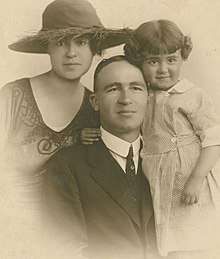
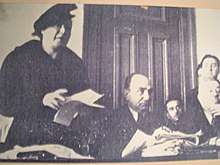
| Born | |
|---|---|
| Name | Sabiha Sertel |
| Year | 1895 |
| Location | Salonika, Ottoman Empire (now Thessalonika, Greece) |
| Death | |
| Date | September 2, 1968 |
| Location | Baku, Azerbaijan USSR |
| Residence | |
| Salonika, Istanbul, New York City, Paris, Budapest, Leipzig, Moscow, Baku | |
| Education | |
| Columbia University, New York School of Social Work | |
| Occupation | |
| Journalist, publisher, author, social/political activist | |
| Publications | |
| Büyük Mecmua (The Big Review), Resimli Ay, (Illustrated Monthly magazine), Tan (Dawn newspaper) | |
| Spouse | |
| Mehmet Zekeriya Sertel (Born 1890, death 1980) | |
| Family | |
| Husband, Mehmet Zekeriya Sertel; daughters, Sevim Sertel O’Brien, Yıldız Sertel | |
Sertel's articles and columns advocated for reforming the rights of women and workers and criticized state oppression, imperialism, fascism and social inequalities in Turkey. Her high-profile activism for democracy, civil liberties and a free press resulted in social and political pressure, censorship, imprisonment and ultimately, exile. Sertel is considered the first to publicly marry outside the dönme community, Jews who converted to Islam in the 17th century but privately retained their beliefs and were viewed with suspicion by Moslems. She was the first Turkish woman to be tried in court and imprisoned for her writings. She also was one of the first Turkish women to die in political exile.
Her marriage in 1915 to Mehmet Zekeriya Sertel, a leading figure in the history of the Turkish press, began a lifelong publishing partnership. Their publications Büyük Mecmua (The Big Review), Resimli Ay, (Illustrated Monthly magazine) and the newspaper Tan (Dawn), served as powerful platforms for opposition voices.
On Dec.4, 1945, a government-orchestrated mob of thousands destroyed the Sertels’ publishing house. In Sertel's autobiography Roman Gibi (Like a Novel), she chronicles the destruction, leading to their imprisonment and ultimately, exile. The book, written in 1968 from exile shortly before her death, originally was banned in Turkey. Over 50 years later, Roman Gibi was translated for an international audience. The Struggle for Modern Turkey: Justice, Activism and a Revolutionary Female Journalist (I.B. Tauris June 2019), introduced English readers to Sertel's story for the first time.
Contents
Early years
In 1895, Sabiha Nazmi was born in the Ottoman port city of Salonika (now Thessaloniki, Greece) to mother Atiye and father Nazmi. She was the youngest of six children. Her family was part of the dönme community, a small group that converted from Judaism to Islam in the 17th century but privately retained their beliefs and was viewed with suspicion by the Muslim population in the empire. By the turn of the 20th century, Sabiha's home was non-practicing and secular like many dönme families.
In her autobiography Roman Gibi, Sertel describes witnessing the starkly unequal relationship of her parents and domestic abuse of her mother. She traces her radicalization as a feminist at the age of eight to the evening when her mother returned home late from visiting her sister. Even though Atiye was supporting the family as a washerwoman, her father, a retired bureaucrat, flew into a rage and divorced her mother on the spot in accordance with Islamic law, throwing her out of the house.
Sertel attended the Terakki Mektebi (the Progress School) in Salonika, completing her high school education from 1902 to 1911. Although women were denied higher education, Sertel founded Tefeyyüz Cemiyeti (the Society for Advancement), with other young women who also wanted to continue their studies. She also began publishing essays, including submissions to a journal published by Zekeriya Sertel. After the Ottoman Empire lost the Balkan War, she moved to Istanbul with her family in 1913.
In 1915, she married Zekeriya Sertel, a Turk, in a headline-making wedding paid for by the Young Turks Central Committee and publicized as an example of a future secular society. In his memoirs, Hatirladiklarim, he describes Sabiha as the first dönme to marry outside of the community. In 1917, she gave birth to their first daughter, Sevim.
The couple started the journal Büyük Mecmua (the Big Review) on March 6, 1919 with other intellectuals. Influenced by the first wave of feminism and the international women's suffrage movement, Sertel's articles for the publication focused on women's rights.
In her memoir, she elaborated on these years and described Büyük Mecmua as a vehicle for discussing ways of rebuilding the country, from Turkish nationalism and New-Ottomanism to socialism and feminism. The book traces the seeds of many of Atatürk's reforms after the War of Independence (1919-1923) to the intellectual debates in Büyük Mecmua, as well as the push for women's equal rights, providing at alternative point-of-view to traditional historical analysis.
In 1919, Zekeriya Sertel, owner of Büyük Mecmua, was imprisoned after the journal criticized Western occupation of the country. Sabiha Sertel saved the publication by taking over editorial responsibilities despite heavy censorship in the post-war period. Her husband was released from prison but the journal closed down shortly afterward.
United States of America 1919-1923
After Büyük Mecmua folded, Sertel moved to New York City with her husband and young daughter to continue their education with the help of scholarships arranged by Halide Edip. She earned her degree at Columbia University from what was then The New York School of Social Work. Sertel studied Friedrich Engels's “The Origin of the Family, Private Property and the State” and August Babel's “Woman and Socialism,” which she would translate later. Sertel also traveled the U.S., unionizing Turkish and Kurdish factory workers as well as organizing fundraisers that raised $100,000 in support of the Turkish National Movement and war orphans. While studying, fundraising and unionizing, Sertel gave birth to her second daughter, Yıldız, on November 1, 1922.
Resimli Ay [Illustrated Monthly magazine] 1924-1931
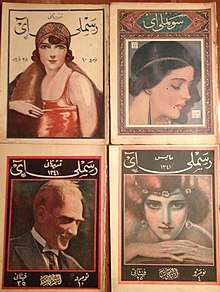
After completing her studies, the Sertels returned to Turkey in 1923 after the War of Independence, and settled in Ankara, the new capital. Sertel's daughters were six and two-years-old at the time. She was offered a position at the Society for the Protection of Children. Sertel proposed conducting a social survey to determine post-war living conditions of children as well as related issues, including the state of health, child labor and education. The project was not approved, and upon her husband's resignation from his position as the General Directorate of Press and Information, they returned to Istanbul.
On February 1, 1924, the Sertels published the first issue of Resimli Ay [Illustrated Monthly], their second major publishing venture. Resimli Ay, modeled after popular illustrated American-style magazines, aimed to attract the general public as well as the country's elites. The journal became known especially for its advocacy of Turkey's literary avant-garde and progressive and socialist political ideas.
Among other writings, Sertel launched her popular advice column under a pseudonym "Cici Anne" [Sweet Mother] in one of the preeminent daily newspapers Cumhuriyet (Republic), providing advice to Turkish families struggling with social reforms and upheavals. She also temporarily took over as editor of Resimli Ay when Zekeriya was again imprisoned for an article he published. In addition to Resimli Ay, Sertel's column "Cici Anne" appeared in Resimli Perşembe (the Illustrated Thursday) and she published Çocuk Ansiklopedisi (Children's Encyclopedia).
In 1928, the Turkish poet Nazım Hikmet, started working for Resimli Ay, where his groundbreaking free-form verse was introduced to readers. An avowed communist, Hikmet remained a close family friend of the Sertels, as well as a major influence on their artistic and political views for the rest of their lives.
In 1930, Sabiha Sertel was again put on a trial, accused of insulting Atatürk with the translation of an article entitled “The Psychology a Leader” from an American psychology journal.
As Resimli Ay’s political positions drew increasing attention from the police, its owners closed the journal down in 1931.
Tan 1936-1945
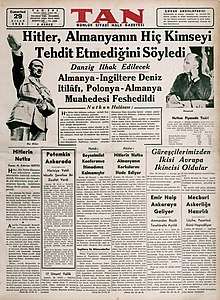
Zekeriya Sertel became co-owner of Tan [Dawn], a struggling Turkish daily newspaper and publishing house. Under the Sertels, Tan became Turkey's second largest newspaper and the couple's final and most prominent publication.
In the lead-up to World War II and during the war itself, the newspaper was known for strongly opposing the ideas and policies of fascist and Nazi movements within Turkey and abroad. In her column “Görüsler” [Opinions], Sertel focused on political issues and warned against forming an alliance with Germany during the war. Critics attacked Sertel, publishing caricatures with insulting titles such as “The Bolshevik Wench” and “The Gypsy with the Pair of Tongs.”
Sertel was banned three times from writing, first in 1941 for criticizing Turkey's collaboration with Germany during the WWII, second for her writing against the nationalist movement in Turkey in 1942, and the third time again in 1942, for her writing about colonialism in the 19th century in relation to both world wars.
While banned, Sertel pursued other projects including translating Karl Kautsky's “The Class Struggle,” Adoratski's “Dialectic Materialism,” Lenin’s “Socialism and War” and August Bebel's “Woman and Socialism” into Turkish. She also published Tan Cep Kitapları (Pocket Books) based on an American book series. In 1936, she wrote a novel Çitra Roy ile Babası (Çitra Roy and Her Father) about a young socialist woman living in India under British colonialism. She published the journal Projektör in 1936.
As the tension between leftist writers and the nationalist press increased, a government-orchestrated mob of thousands destroyed the Sertels’ Tan newspaper and publishing house on December 4, 1945. The destruction of Tan became an international incident. The Sertels were arrested, taken to Sultanahmet Prison in 1946 and stood trial. Although ultimately acquitted, the Sertels remained under police surveillance, unable to work. Sertel's autobiography ends with the couple's decision in 1950 to flee the country, in fear of their lives.
Exile years 1950-1973
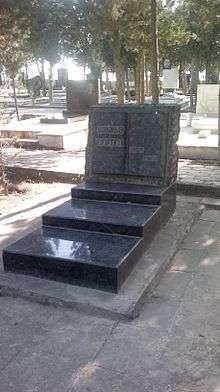
Sabiha Sertel spent the rest of her life in exile, living in Paris, Budapest, Leipzig, Moscow and Baku (Azerbaijan). While in Budapest and Leipzig, she worked in radio for the Turkish Communist Party (TKP) abroad. In 1958, the Sertels secretly collaborated with Nazım Hikmet on “Bizim Radyo”, a communist-funded radio station broadcasting news to Turkey from Budapest, Hungary. The Sertels agreed to write news and other content as long as it was uncensored and worked from Leipzig, East Germany. Their involvement continued until 1962. With Hikmet's help, they relocated to Baku where Sertel died from lung cancer on September 2, 1968.
Sertel remained a prolific author, writing her book about Tevfik Fikret (poet), and memoirs about Nazım Hikmet (poet) and Sabahattin Ali (author), as well as her memoir Roman Gibi. The autobiography is limited to the period from 1915 to 1950, chronicling her rise and fall as a professional journalist and publisher. She never mentions her controversial origins as a member of the dönme community in Salonika. Dönme was considered a derogatory term, especially in the new Turkish nation-state. It refers to Jews who converted to Islam in the 17th century but privately retained their beliefs and were viewed with suspicion by Moslems.
Sertel contended that Turkey was not ready for a socialist revolution, and as a result she supported reforms of the new government. Nevertheless, she did not hold back from pointing out the undemocratic path that the new republic took. While she found the reforms of the new republic plausible in theory, including those regarding women's rights, she did not hesitate to criticize how they failed in practice.
References
- Akanyıldız-Gölbaşi, R. Çiğdem. “An Alternative Voice: Sabiha (Zekeriya) Sertel as a Woman Translator and a Representative of Nascent Socialist-Feminist Culture Repertoire in the Early Republican Turkey,” Feminist Voices,Jan 2016; 33-56.
- FemBio Notable Women International
- Libal, K. “Transatlantic Connections in the Making of a Socialist–Feminist Framework for Social Welfare in Turkey: The Legacy of Sabiha Zekeriya Sertel.” Affilia, 2012. 27(3), 328–337.
- Shissler, A. H. “‘IF YOU ASK ME’ Sabiha Sertel's Advice Column, Gender Equity, and Social Engineering in the Early Turkish Republic,” Journal of Middle East Women's Studies, 2007. 3(2), 1-30.
- Shissler, A. H. “Womanhood Is Not for Sale: Sabiha Zekeriya Sertel Against Prostitution and for Women's Employment”, Journal of Middle East Women's Studies, 4(3). 2008. 12-30.
- Bulut, Ayça. “Kemalist Dönem toplumsal cinsiyet politikası ve kadın hareketi çerçevesinde Sabiha Sertel üzerine bir inceleme,” Hacettepe University, Social Sciences Institute, 2002, Ankara.
- Erduran, Refik. Sabiha, Istanbul: Remzi, 2004.
- Ertuna Biçer, Burcu. “Erken Cumhuriyet Dönemi Aydını Sabiha Zekeriya Sertel’in Fikir Yazılarında Modernleşme Bağlamında Kadın, Toplum ve Siyaset.” Marmara University, Social Sciences Institute, December 2008, Istanbul.
- Ertuna Biçer, Burcu et al. Biyografya 9, Sabiha Sertel, Istanbul: Bağlam, 2010.
- Koçak, C. (1988) ‘1930 Belediye Seçiminde Sabiha Sertel’in Adaylığı,’ Tarih ve Toplum, no: 51, pp. 28‒29.
- The Struggle for Modern Turkey: Justice, Activism and a Revolutionary Female Journalist I.B. Tauris, June 2019
- Semiz, Hülya. “İkinci Dünya Savaşı döneminde gazeteci Sabiha Sertel’in döneme ilişkin görüşleri,” Istanbul University, Social Sciences Institute, 2008, Istanbul.
- “Sertel, Sabiha”, Tanzimattan Bugüne Edebiyatçılar Ansiklopedisi, Istanbul: YKY, 2010.
- Sertel, Yıldız. Annem: Sabiha Sertel Kimdi Neler Yazdı.Yaşantı, Istanbul: YKY, 1994.
- Sertel, Zekeriya, Hatırladıklarım. Istanbul: Remzi Kitabevi, 2000.
- Toprak, Zafer. “Sabiha Sertel ve Türk Feminizmi”, Toplumsal Tarih, No:51, March 1998.
Works: Sabiha Sertel
- Çocuk Ansiklopedisi,1927-1928 four volumes with Zekeriya Sertel and Faik Sabri, (Children’s Encyclopedia)
- Çitra Roy ile Babası, 1936 (Çitra Roy and Her Father)
- İlericilik-Gericilik Kavgasında Tevfik Fikret, with a different title in 1945 (Tevfik Fikret in Progressivism and Reactionism Debates)
- Tevfik Fikret-Mehmet Akif Kavgası, 1940 (the Debate of Tevfik Fikret - Mehmet Akif)
- Tevfik Fikret: İdeolojisi ve Felsefesi,1946 (Tevfik Fikret: His Ideology and Philosophy)
- Davamız ve Müdafaamız, 1946 with Zekeriya Sertel (Our Case and Our Defence)
- Roman Gibi, 1969 (Like a Novel)
- İkinci Dünya Savaşı Tarihi,1999 (History of the WWII)
Translations by Sabiha Sertel ( English to Turkish)
- K. Kautsky, The Class Struggle(1934)
- A. Bebel, Women and Socialism(1935)
- V. Adoratsky, Dialectical Materialism(1936)
- The Constitution of the Soviet Union (1936)
- J. Bryce, Modern Democracies(1939)
External links
- https://www.struggleformodernturkey.com
- https://www.bloomsbury.com/us/the-struggle-for-modern-turkey-9781788313575/
- https://www.publicbooks.org/turkeys-progressive-past/
- http://america.aljazeera.com/opinions/2015/12/turkeys-long-history-of-attacks-on-the-press.html
- https://journals.sagepub.com/doi/abs/10.1177/009614421664107
- http://www.fembio.org/english/biography.php/woman/biography/sabiha-sertel/
- Biographical Dictionary of Women’s Movements and Feminisms: Central, Eastern, and South Eastern Europe, 19th and 20th Centuries
- https://www.biyografi.info/kisi/sabiha-sertel/kitaplari
- http://www.biyografya.com/biyografi/11222
- http://en.writersofturkey.net/index.php?title=Sabiha_Sertel